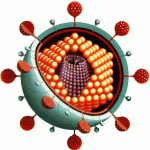Virology
|
22 may 2015 09:00:29 |
| A KCNJ10 mutation previously identified in the Russell group of terriers also occurs in Smooth-Haired Fox Terriers with hereditary ataxia and in related breeds (Epidemiologic Perspectives & Innovations) |
|
Tweet Background:
Hereditary ataxias with similar phenotypes were reported in the Smooth-Haired Fox Terrier, the Jack Russell Terrier and the Parson Russell Terrier. However, segregation analyses showed differing inheritance modes in these breeds. Recently, molecular genetic studies on the Russell group of terriers found independent mutations in KCNJ10 and CAPN1, each associated with a specific clinical subtype of inherited ataxia. The aim of this study was to clarify whether or not Smooth-Haired Fox Terriers with hereditary ataxia and dogs of other related breeds harbor either of the same mutations. A sub goal was to update the results of KCNJ10 genotyping in Russell group terriers.FindingsThree Smooth-Haired Fox Terriers with hereditary ataxia and two Toy Fox Terriers with a similar phenotype were all homozygous for the KCNJ10 mutation. The same mutation was also found in a heterozygous state in clinically unaffected Tenterfield Terriers (n = 5) and, in agreement with previous studies, in Jack Russell Terriers, Parson Russell Terriers, and Russell Terriers.
Conclusions:
A KCNJ10 mutation, previously associated with an autosomal recessive spinocerebellar ataxia in Jack Russell Terriers, Parson Russell Terriers, and Russell Terriers segregates in at least three more breeds descended from British hunting terriers. Ataxic members of two of these breeds, the Smooth-Haired Fox Terrier and the Toy Fox Terrier, were homozygous for the mutation, strengthening the likelihood that this genetic defect is indeed the causative mutation for the disease known as “hereditary ataxia” in Fox Terriers and “spinocerebellar ataxia with myokymia, seizures or both” in the Russell group of terriers. |
| 190 viewsCategory: Pathology, Virology |
 Anti-HER2 CD4+ T-helper type 1 response is a novel immune correlate to pathologic response following neoadjuvant therapy in HER2-positive breast cancer (Epidemiologic Perspectives & Innovations) Anti-HER2 CD4+ T-helper type 1 response is a novel immune correlate to pathologic response following neoadjuvant therapy in HER2-positive breast cancer (Epidemiologic Perspectives & Innovations)Iris classification based on sparse representations using on-line dictionary learning for large-scale de-duplication applications (Epidemiologic Perspectives & Innovations) 
|
| blog comments powered by Disqus |
MyJournals.org
The latest issues of all your favorite science journals on one page
The latest issues of all your favorite science journals on one page



